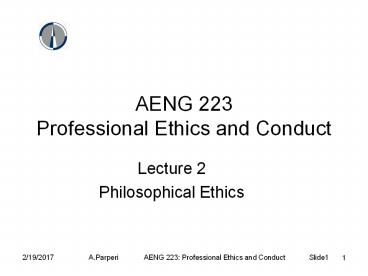AENG 223 Professional Ethics and Conduct - PowerPoint PPT Presentation
1 / 9
Title:
AENG 223 Professional Ethics and Conduct
Description:
AENG 223 Professional Ethics and Conduct Lecture 2 Philosophical Ethics Philosophical Ethical Analysis Claim, then give reasons / arguments and critically evaluate ... – PowerPoint PPT presentation
Number of Views:103
Avg rating:3.0/5.0
Title: AENG 223 Professional Ethics and Conduct
1
AENG 223Professional Ethics and Conduct
- Lecture 2
- Philosophical Ethics
2
Philosophical Ethical Analysis
- Claim, then give reasons / arguments and
critically evaluate them can we support our
claim? - Consistency is crucial.
- From initial belief move to argument, from
argument to better (or reformulated) argument,
from theory to case. - A definitive conclusion not always made.
- However, understanding of our moral beliefs might
be improved, deeper and more consistent beliefs
might be developed.
3
Descriptive and Normative Claims
- Descriptive claims What people think and do
(behaviour and thoughts). Are drawn after
empirical data examination and report of the
findings. - Descriptive claims do not tell us what is right /
wrong, what people should think and do, or
describe how people behave. - Normative claims Philosophical ethics is
normative. Its aims are to explore what people
ought to do, evaluate arguments, reasons and
theories and finally report on what types of
behaviour are good or bad, right or wrong, as
well as help us understand what rules and
policies should be applied in computer and
information technology.
4
Philosophical Ethics
- Philosophical Ethics
- Ethical Relativism.
- Utilitarianism.
- Act and rule utilitarians.
- Deontological Theories and Kantianism.
- Rights.
5
Ethical Relativism
- Ethical Relativism ethics is relative.
- Is ethics relative? What might be wrong / right
for you might not be so for me? - Negative claim If they are relative, then there
are no universal moral norms or rights / wrongs. - Positive claim Right / wrong is relative to the
society we live. - Positive Claim - different cultures consider
right / wrong in a different way. - - moral norms of a society change
over time. - - upbringing and
experiences determine our moral ideas (when,
where, how, by whom we were raised).
6
Ethical Relativism
- However, diversity of opinion about right / wrong
does not tell us that right or wrong is relative.
(consider the earths shape example) - Also, the fact that our social environment shapes
our moral beliefs, does not mean that they are
right or wrong. (consider sexism and racism) - Theory of ethical relativism is
self-contradictory - - Right / wrong relative to the social
context, then our moral ideas are determined
solely by the rules of the society, so we should
do what our society directs us. While ethical
relativists deny the existence of universal
rules, they assert one. - - Right / wrong is determined by the culture
of people and the time when they lived. So,
different moral beliefs should not be judged,
arrogant behaviour is not accepted, only respect
is, so we ought to behave in a certain way.
Thus, they again assert a universal rule. - Case illustration Hitler
7
Utilitarianism
- Utilitarianism we should act in such a way so as
to bring about the greatest amount of happiness
for the greatest amount of people. - Instrumental goods are valued as they lead to
something else ex. Money (want x as it leads to
y, then y is what values, not x). - Intrinsic goods are valued for what they are ex.
Knowledge, beauty, nature, the ecosystem etc. - Utilitarians happiness is the ultimate intrinsic
good, valued for what it is, everybody wants to
achieve happiness.
8
Utilitarianism
- Individuals facing a dilemma consider
alternatives (A, B, C etc), predict consequences
of each, choose the action that will bring about
the most happiness (not egoism good consequences
for yourself). - Rule-utilitarians difficult to predict
consequences, have to act quickly so no time, not
practical. Certain rules should be applied and
followed in order to maximize happiness. - Act-utilitarians actions are emphasized, rules
are rejected. - Everybody is equal in happiness.
Self-contradictory acceptable to sacrifice the
happiness of one to achieve the happiness of the
many? - Case illustration Kidney dialysis machine
9
Deontological Theories
- Deontological Theories some actions are morally
obligatory regardless of the consequences. If an
action is done from a sense of duty, then it is
right. - Immanuel Kant people rational, make choices as
have the rational capacity, do not merely act in
accordance with the law (plants) but in
accordance with the conception of the law. Never
treat another human being merely as a means, but
always as an end (they have the right to choose). - Rights Every individual must be respected as
valuable, have rights ex. not to be killed,
enslaved, to be given freedom, make decisions, be
allowed to own and so on.






























